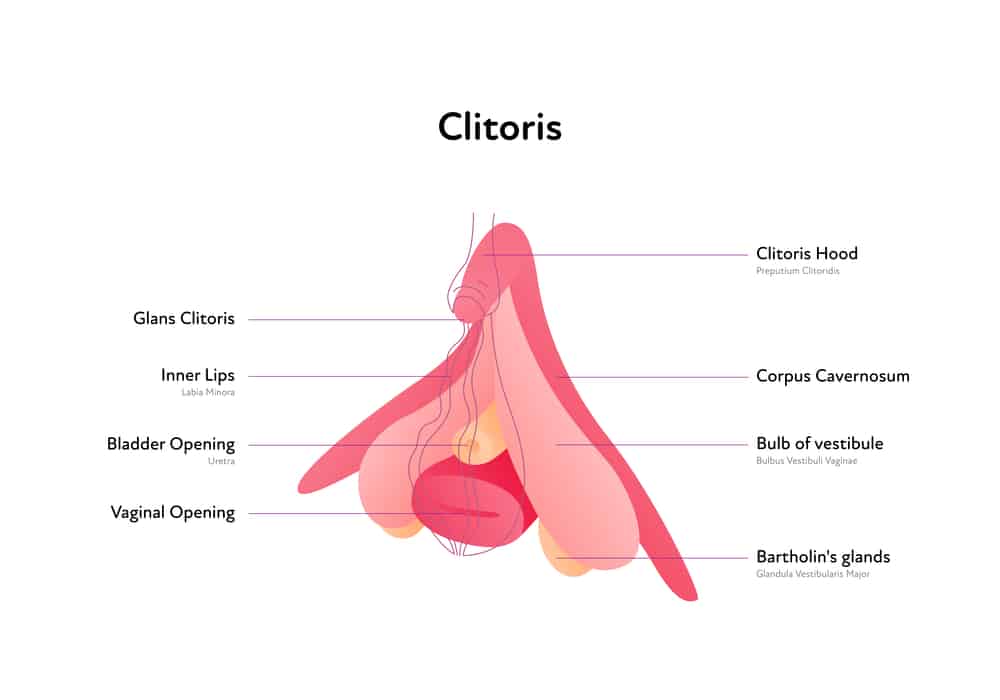Last Updated on February 13, 2024 by Kelly
Have you heard of clitoral atrophy? If you are concerned about your sexual health or have spoken to a doctor about diminished sensation in the clit, you may have come across it.
Clitoral atrophy is nothing to be ashamed of, but it isn’t pleasant, either. Fortunately, there are plenty of ways to diagnose it and address it.

In this article, read on to learn what clitoral atrophy is, what might cause it, and what could help.
While we are not medical professionals, we hope this is a helpful look into an under-discussed issue! If you think you may have clit atrophy, you should speak to a doctor to learn more.
Contents
What is Clit Atrophy?
Clitoral atrophy is when the clitoris stops functioning the way it should. This is not to be confused with vaginal atrophy, although they are similar issues.
The clitoris is the organ in the vulva that is the most sensitive to sexual pleasure. It has a huge number of nerve endings and is known as the pleasure organ.
Although the clitoris has both an exposed and internal portion, most people think of the soft spongy nub at the front of the vulva. The clitoris actually stretches into the body, as well.
The inner portion of the clitoris is also known as the g-spot. But in casual conversation, when we talk about the “clit” we’re talking about that small, fleshy button.

When the body becomes sexually aroused, blood flows to the vulva and into the clitoris, making it even more sensitive.
Clitoral atrophy occurs when the clitoris no longer responds to this arousal or does not respond as strongly. The clit remains small and dry even if you feel mentally turned on and ready for sex.
When clitoral atrophy occurs, you may not be able to become aroused at all, or it takes a lot of time and effort to get there.
Clitoral atrophy can also lessen or entirely prevent the ability to orgasm, depending on the severity. Some people can only orgasm through clitoral stimulation.
While this is a serious issue, and you should talk to a doctor about it if you feel concerned, all is not lost.
First of all, plenty of people can become aroused and even get off through stimulation outside of the vulva and vagina, such as nipple stimulation.
But more importantly, there are many treatment options for clitoral atrophy. Below we will discuss some of them as we look more closely at this misunderstood issue.
Seeking help and coming up with solutions is the best step you can take if you feel concerned about clitoral atrophy.
What Are The Causes of Clitoral Atrophy?
Lack of Blood Flow
It may not seem romantic, but when we get down to the basics, clitoris arousal is mainly determined by blood flow.
When you become aroused, blood flows to the clitoris, causing it to expand and become more sensitive to the touch.
A lack of blood flow could be preventing blood from quickly and easily getting to the clitoris. This would, in turn, lead to clit atrophy.
Perhaps you have circulation issues or need to talk to your doctor about medication or other issues that might cause your blood flow to change.
Low Testosterone Levels
Decreasing testosterone levels are also a known cause of clitoral atrophy.
Testosterone can decrease in the body for a few reasons, but one cause can be menopause.
If you are of menopausal age, it might be worthwhile talking to a doctor about what types of hormone changes your body could be going through.
Other Hormone Changes
Along with low testosterone levels, imbalances of different hormones can also cause issues with sexual stimulation and arousal.
People taking birth control or hormonal supplements may experience clitoral atrophy due to these changes.
Who Is More Likely To Be Affected By Clitoral Atrophy?
Not everyone is equally likely to develop clitoral atrophy. There are a number of reasons why clit atrophy can occur.
Do any of the following sound familiar to you? These might be things to discuss with your doctor in determining how best to treat you.
Lack of Sexual Arousal and Stimulation
A major cause of clitoral atrophy is underuse. If the clitoris goes ignored and does not regularly experience arousal, like any part of the body, it can begin to atrophy or weaken.
There could be many causes for the lack of sexual arousal and stimulation. There are plenty of reasons why someone might be having less sex or experiencing fewer moments of arousal.
Mental health issues like depression or body insecurity can cause people to feel less sexual desire and have less sex.
Physical issues like stress can also lead to a lowered sex drive. If someone has been working too hard, they often are not going to be in the mood as easily.
The good news is that the solution to low arousal is straightforward, even if it may be challenging.
Getting back into a regular schedule with sex or masturbation is the way to address clitoral atrophy caused by underuse.
If you do not have a partner, do not let that make you think you can’t experience sexual arousal!
Masturbation is nothing to be ashamed of and will help get you back into a sexual rhythm.
Birth Control
If you are taking hormonal birth control, you could be more likely to develop clitoral atrophy.
Testosterone is the hormone that controls your libido or sex drive.
When hormonal levels change, and testosterone levels drop, that can cause the clitoris to stop responding to arousal.
Menopause
During and after menopause, the body undergoes many changes, including thinning vaginal tissue and hormonal changes.
If you are pre- or post-menopausal, you may be more susceptible to clitoral atrophy. You may notice the clitoral glans becoming smaller or even impossible to find.
Estrogen Supplements
If you have been taking estrogen supplements for any reason, this could cause hormonal imbalances leading to clitoral atrophy.
Testosterone levels can decrease when estrogen increases in the body.
These hormonal changes can happen for many reasons, as listed above, but estrogen supplements can also be a cause.
Hysterectomy
A hysterectomy is when the ovaries are removed from the body. The ovaries produce both testosterone and estrogen, so their removal could cause testosterone to drop.
If you have received a hysterectomy, this can also cause issues with your hormone levels, which would, in turn, possibly lead to clitoral atrophy.
If you have had a hysterectomy and are experiencing clitoral atrophy, be sure to mention this history to a doctor if they do not know already.
Does Clitoral Atrophy Go Away?
Yes, clitoral atrophy can go away or lessen in severity with treatment. There are many ways that the symptoms of clitoral atrophy can be treated, depending on the cause.
Before attempting to treat clitoral atrophy, the most important thing to do is to speak to a doctor.
They will be able to understand better what is causing your clitoral atrophy and can recommend several treatment options for you.
If you want to make the most out of your appointment, write down all of the symptoms that you notice that seem related to your sexual health and your clitoris.
If you feel nervous about bringing this up with your doctor, it always helps to go in with a plan. If you have notes, you won’t fumble for the right words.
It can also be helpful to remember when you first noticed these issues, even if you don’t have an exact date.
Knowing the range of symptoms, the severity, and the time they have been going on will help your doctor diagnose and treat your clitoral atrophy.
Some treatment options include increasing sex or masturbation, increasing cardio exercise, using topical or oral hormonal supplements, or addressing mental health issues.
Another treatment option is to seek out a sex therapist. They will be able to work with you on issues related to sexual health and arousal.
There is nothing wrong with going through a dry spell or not being interested in sex.
But if you are concerned about clitoral atrophy and want to experience sexual arousal again, then seeking treatment with a doctor or therapist will be the best course.
Using Clit Suckers As a Treatment For Clitoral Atrophy
One method for addressing clit atrophy is to get the clitoris back into regular use. The good thing is that you are not alone in facing this task, even if you’ve been in a dry spell.
There are so many unique sex toys available for servicing your clitoris in a way that feels best for you.
If you don’t like penetrative toys like dildos, you’re in luck.
One of our favorite toys for stimulating the clit are clit suckers, also known as clit sucking vibrators.

You may have seen viral posts about toys like the Rose vibrator or the Satisfyer Pro that have provided women with life-changing orgasms.
If you are trying to get back into a habit of masturbation, clit vibrators could be your new best friend.
There are so many options for you to choose from. You can get a toy that uses air pressure to send a tickling sensation to the clit, like the We-Vibe Melt or the Lelo Enigma.
Or you can get toys that actually “lick” the clitoris and mimic oral sex, like the Fantasy Pussy Pump.
If you have not been a sex toy person or feel wary about the purchase, many of these toys are low-key and great for beginners.
You should start with a smaller, low-price toy with more gentle vibrations.
Along with choosing a suitable toy, you want to ensure that your masturbation ritual is designed to maximize your pleasure.
Once you have your clit sucker, set the mood with music, lighting, scents, and any other ambient choices that put you at ease.
Another trick with clit suckers is to use them with lube. Any sex toy shop you purchase from will surely sell lubricants and toys.
It’s a good idea to invest in a bottle of water-based lube with your clit sucking toy to get the most out of its pulsing sensations.
With the clit sucker on your side, you should be back into the swing of things in no time. Keep your new toy close by your bedside and use it regularly.
Remember to clean your toy before and after use.
Also Read: Using a Clitoral Sucking Vibrator Properly
Other Treatments for Clit Atrophy
Underuse is only one cause of clit atrophy, so increasing use through masturbation is just one possible treatment.
Another option that might make arousal easier is using a sexual stimulant like lube or lotion. You could look into a CBD lubricant if it’s legal where you live.
It is possible that even with regular masturbation or sex, clitoral atrophy could continue. In those cases, it is definitely crucial for you to talk to a doctor about other treatments.
Other treatments could include addressing blood flow issues through increased exercise and diet changes.
Another treatment could be more complex through hormonal therapy. This might require a blood test to see your hormone levels and check for imbalances.
Your doctor may be about to prescribe you either a topical or pill-form estrogen supplement that could balance your hormones.
There is also continuing research on different types of hormonal treatments. Talk to your doctor about what else might be available.
When To Speak To Your Doctor
It never hurts to be cautious, so you should raise concerns about your sexual health as soon as possible.
If you are struggling with sexual arousal or pleasure or have noticed a decrease in your arousal levels over time, this may signal that you should discuss clit atrophy.
If you experience any pain during sex, including masturbation, you should take this seriously. Your doctor can talk through symptoms and treatment options.
Finally, another reason to speak to a doctor is if you have been observing changes related to hormones, such as symptoms of menopause or changes since taking birth control.
Your doctor can order an exam or blood test to check your signs and symptoms and determine your best treatment plan.
If you feel uncomfortable bringing this up to your general care doctor, you can always schedule an appointment with an OB-GYN.
Another option is to seek out mental health care, as a sex therapist will also have recommendations for doctors you can see.
It might seem easy to push this off, but your sexual health matters. If you are concerned about your libido, you deserve to have your mind at ease.
You deserve to have the sexual pleasure that you want, and there are many ways to ensure that happens with the treatments listed here. Talk to your doctor as soon as you can.
